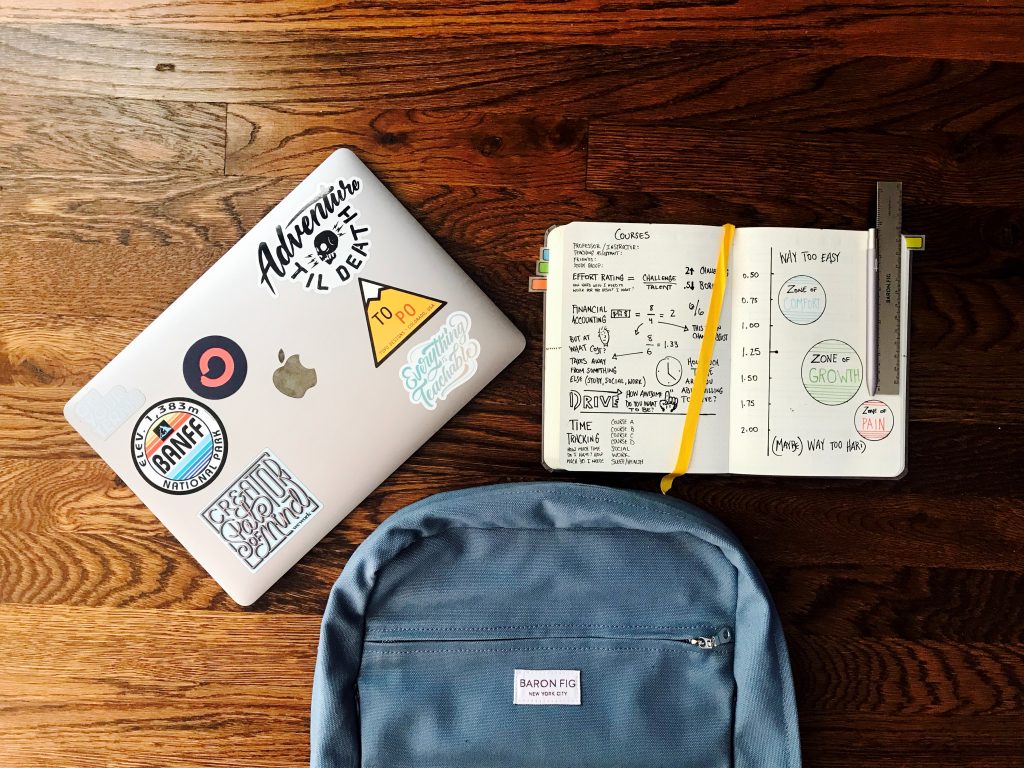Back to School Anxiety: Coping Skills for Your Teen
If you’re noticing your teen is a little edgy lately or seems less than keen to talk about school they may be struggling with ‘back to school anxiety’. The usual pre-jitters and mix of excitement and nervousness of going back to school could be prompting thoughts like these for your teen:

Photo by Canva
- Who will I be in class with?
- What if I get that teacher again?
- I can’t wait to see my friends again!
- I hope I will get good grades.
This year may be especially hard for teens if they struggle with social anxiety and enjoyed the online aspect of schooling again this year. On top of the regular ‘back to school’ worries, your teen may be thinking:
- What if it’s really hard?
- What if I’m behind?
- What if we have to wear masks again?
- What if things shutdown again?
- What if I don’t like it?
Sometimes teens don’t have an exact grasp on the specific thoughts but their worries manifest physically. You might notice complaints of physical symptoms like headaches, stomach aches, general flu like symptoms with no illness related causes, etc. You may also notice changes in behaviours – more irritability, sleep disruptions, etc.
Worries about going back to school – especially this year – are to be expected…. BUT that doesn’t mean your teen has to white knuckle through it.
Here are five anxiety coping strategies you can implement to help your teen transition back to class as smoothly as possible:
Anxiety Coping Skill #1

Photo by Canva
Breathing can be a secret weapon for your teen. Dialling into their breathing can help activate their rest and relax system (parasympathetic nervous system). This sets off a domino effect of calming.
There are various breathing techniques you can try. Sheryl Ankrom, MS, LCPC shares eight different breathing exercises you can try here. Square breathing, or 4×4 breathing is one I find works well, and can be done anywhere anytime – including on the way to the school, in the hallways, and even in class. The Sunnybrook Hospital in Toronto shares a really great video on how to do this exercise here.
Whichever exercise your teen chooses, I recommend going through it at least 4 times to allow their nervous system to catch up.
Breathing exercises aren’t for everyone. If your teen can’t focus on their breathing, or doesn’t enjoy it – try having them focus on some of their other senses. Here are a few ways they can do that:
- Look around the room and (in their mind) name objects they can see
- Pick a colour and try and spot it as much as possible
- Listen for sounds near or far
- Name one thing from all 5 senses – something they can see, hear, smell, feel and taste
The key is to bring awareness to the present moment and be less hyper focused on the anxiety.
Anxiety Coping Skill #2

Photo by Canva
We all have objects in our lives that immediately bring comfort. They serve as relaxation prompts. It can be helpful for your teen to have an object like this with them as they begin the new school year. Here are some ideas, or things I have seen work well:
- Favourite piece of jewelry
- Extra comfy sweater
- Stone/crystal around their neck, or tucked in their bag
- A note/quote/message on their phone
- Putty
- Favourite playlist on their phone (if permitted)
- Doodle a small heart on a knuckle
- Fidget ring around their finger
Having something that reminds your teen of comfort and calm will cause their brain to put out some chill alpha waves.
Anxiety Coping Skill # 3
Encourage your teen to find at least one person they can rely on that has got their back – a coping buddy. They can have more than one of course! It might be a teacher, guidance counsellor, friend, sibling, etc. Someone they can seek out and connect with when needed. This person can provide a nice distraction, or some comfort.
If your teen really can’t think of anyone that is accessible at school, see if you can find someone remote who can be available for a call or text during an anxious moment – you, their auntie, etc.

Photo by Canva
Anxiety Coping Skill # 4
Use the F.E.A.R. technique. This stands for False Evidence (or Emotions) Appearing Real.
Anxiety can trick your teen’s mind to make them believe they are small and incapable in the face of the problem or thing they fear. The F.E.A.R technique is a way to bring balance in the other direction – with anxiety being small and your teen being big and capable.
Step One: Identify the worry (fear) – e.g. ‘I’m worried that I won’t be in the same class as any of my friends.”
Step Two: Dig deeper – what would happen if your friends weren’t in your class? What’s anxiety telling you? – e.g. ‘I will have no one to talk to all year. I will be lonely.’
Step Three: Flip it around – what could you do if your friends aren’t in your class? How could you respond? How could you solve this? – e.g. ‘Could be a total loner and not talk to anyone all year,
I guess I could make new friends, I could find my friends during breaks, I could join a club or something at lunch, I could ask to be switched classes, I could talk to the person sitting next to me, etc.’
This technique gives the worry clear words and takes your teen down that FEAR acronym. It lets them know that even if the scary thing does happen, they have a lot of control and choice to do something about it!
Anxiety Coping Skill # 5

Photo by Canva
Create a plan and a routine so your teen knows what to expect. It is helpful to focus on what is in your teen’s power to control (their routine) and what is not.
A routine for school starts the night before – with a good amount of sleep, taking time to relax before bed, etc. Encourage your teen to include some things in their routine they enjoy.
You can also help your teen plan ahead for when they get to school – who will they meet up with? Do they know which classes they are in? What time does school start and end?
Having a plan around things that your teen can actually control (e.g. their responses, behaviours, what thoughts they tend to, etc.) can help quell some of that anxiety.
Things to Make Note Of:

Photo by Canva
Your teen is not alone in their anxiety – going back to school can be an anxiety-inducing experience in ‘normal’ times. Never mind the times we are in now! Let them know they are not the only ones. Ask them about their back to school thoughts.
What are they most stressed/worried about?
Another thing you can do is focus on the things they are looking forward to. Get them to pay attention to the friends they may get to see again, the school club they will join, etc.
Anxiety can be a big deal but it doesn’t have to take over yours or your teen’s life – Share this blog with a parent of a teen and spread the support!
The Happiness Pill Program is a 6-month teen life coaching program that supports teens to shift beyond anxiety, depression, and overwhelm and into confidently living the life they want by providing ongoing support. There is a built-in parent program and community to support you, too. Get on the path to freedom from teen anxiety here.
Love,
Chantal
 Chantal Côté (she/her) is a psychologist and teen life coach living in Calgary, Alberta. After over a decade in non-profit and community mental health, Chantal started Pyramid Psychology, a practice dedicated to supporting teens – a population she is constantly amazed by. Chantal is on a mission to help 100,000 teen girls (and their parents) build bulletproof mindsets so they can weather the ups and downs of life. As part of this goal, Chantal has had the privilege of speaking at various events – virtual and live – to support teens and parents.
Chantal Côté (she/her) is a psychologist and teen life coach living in Calgary, Alberta. After over a decade in non-profit and community mental health, Chantal started Pyramid Psychology, a practice dedicated to supporting teens – a population she is constantly amazed by. Chantal is on a mission to help 100,000 teen girls (and their parents) build bulletproof mindsets so they can weather the ups and downs of life. As part of this goal, Chantal has had the privilege of speaking at various events – virtual and live – to support teens and parents.
Outside of this passion, Chantal is often in nature, writing poetry, playing ball hockey and hanging out with her loved ones.
Each week, Chantal writes a blog article in response to issues she hears from the parents and teens she connects with. If you have something you’d like to read more on – email ideas and questions to info@pyramidpsychology.com or DM us via Instagram or Facebook.

















